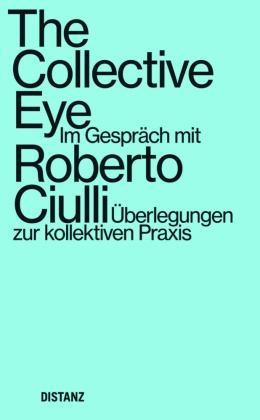
The Collective Eye - Im Gespräch mit Roberto Ciulli - Überlegungen zur kollektiven Praxis
| Verlag | Distanz Verlag |
| Auflage | 2021 |
| Seiten | 104 |
| Format | 11,0 x 0,8 x 17,8 cm |
| Großformatiges Paperback. Klappenbroschur | |
| Gewicht | 102 g |
| Reihe | The Collective Eye - Thoughts on Collective Practice |
| ISBN-10 | 3954763877 |
| ISBN-13 | 9783954763870 |
| Bestell-Nr | 95476387A |
"Wenn es überhaupt einen produktiven Ort kollektiver Intelligenz gibt, so ist es das Theater."
Kein Theater geht freier im deutschen Sprachraum mit klassischen und zeitgenössischen Stücken um als das 1980 gegründete Mülheimer Theater an der Ruhr. Roberto Ciulli (geb. 1934 in Mailand, Italien, lebt und arbeitet in Mülheim a. d. Ruhr) ist Urvater des multikulturellen Theaters im Herzen des Ruhrgebiets und prägt bis heute die Theaterlandschaft Deutschlands. Für seinen unermüdlichen, jahrzehntelangen Einsatz um die Verständigung zwischen den Kulturen und für seinen prägenden Einfluss als Theatermacher erhält Ciulli 2014 den Staatspreis des Landes Nordrhein-Westfalen. Er ist stilprägend für ein Theater, das sich von seinen eurozentristisch-christlich dominierten Rollenklischees löst. Für Ciulli wohnt im Theater die utopische Möglichkeit inne, eine kollektive Intelligenz zu entwickeln, die den Blick für neue Gesellschaftsformen öffnet - hin zu einer Bühne, die Raum für das So ziale schafft.
The Collective Eye sprach mit dem Ausnahmeregisseur über seinen anthropologischen Blick auf das Theatermachen, ein neues und freies Verständnis von Autor_innenschaft, Sprache und den kollektiven Wunsch nach Verständigung und Utopien einer anderen Gesellschaft, die sich im Theaterspiel darbieten. Weitere Ausgaben der Buchreihe sind erschienen mit Elmgreen & Dragset sowie Slavs and Tatars.
ÜBER THE COLLECTIVE EYE
The Collective Eye (TCE) ist ein Projektkollektiv mit wechselnden Mitgliedern. In Interviews, Symposien, Ausstellungen und Gesprächsbänden geht es um die Stärkung eines multinationalen Dialogs zwischen Kollektiven und Theoretiker_innen in der Auseinandersetzung mit kollektiver Kreativität und Praxis in den Künsten. Dabei blickt TCE transdisziplinär auf Formen der Zusammenarbeit in bildender und darstellender Kunst, in Theatern, Museen sowie Zwischenräumen kultureller Produktion.
"If there's one place where coll ective intelligence becomes productive, it's the theater."
No stage takes greater license with classics and contemporary plays alike than the Theater an der Ruhr in Mülheim, founded in 1980. The godfather of multicultural theater in the heart of the Ruhr, Roberto Ciulli (b. Milan, Italy, 1934; lives and works in Mülheim a. d. Ruhr) has long been a prominent figure on the German theater scene. In 2014, Ciulli was awarded the State Prize of the State of North Rhine-Westphalia in recognition of his decades-long untiring efforts to promote intercultural understanding and his defining influence over the country's theater culture. His vision of a theater that breaks free of the Eurocentric and Christian-dominated role clichés is widely admired. As Ciulli sees it, the theater has the utopian potential to develop a collective intelligence that opens up perspectives of a novel communal order-toward a stage on which the social can unfold.
The Collective Eye spoke to the except ional director about his anthropological take on theater work, a new and liberal conception of authorship, language, and the collective desire for understanding and utopias of a different society that theatrical practice makes manifest. Previous books in the series have featured Elmgreen & Dragset and Slavs and Tatars.
ABOUT THE COLLECTIVE EYE
The Collective Eye (TCE) is a project collective whose membership fluctuates. In interviews, symposia, exhibitions, and books for which TCE engages selected partners in dialogue, it seeks to strengthen a multinational dialogue between collectives and theorists grappling with collective creativity and practices in the arts. Its scope transcends boundaries of discipline, encompassing forms of collaboration in the visual and performing arts, in theaters, museums, and the interstices of cultural production.
